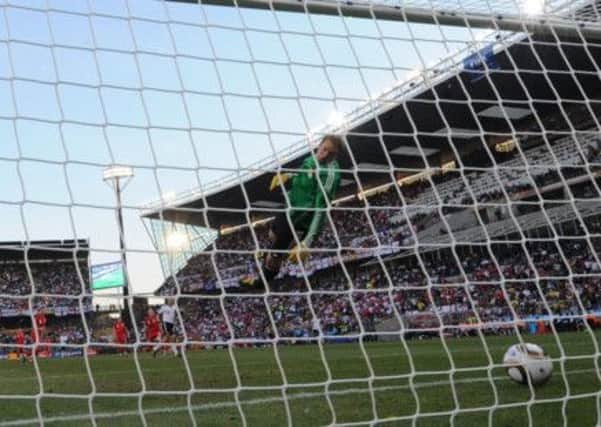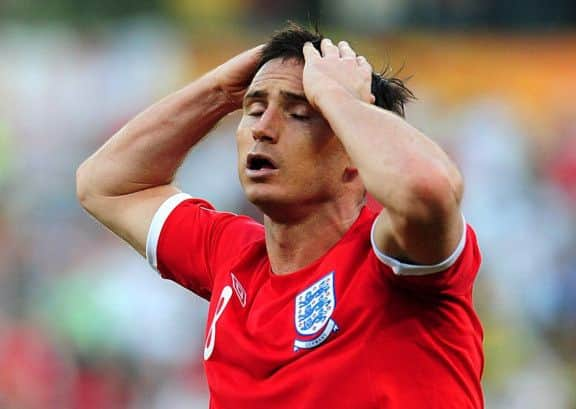Technology could remove football’s talking points


In a world where evolution in the form of technology and robotics is monopolising industry - rendering humans as obsolete - do we really want our beloved game to head in a similar direction?
Ultimately it’s the anomalies, conundrums and controversy that provide football fans with a platform of conversation after every fixture. For decades people have found solace and unity in questioning contentious decisions made by match officials with friends, family or even complete strangers.
Advertisement
Hide AdAdvertisement
Hide AdWhile the majority vociferously back its introduction there are still many footballing purists that stand in unison with UEFA president Michel Platini. My opinions swing like a pendulum - depending on the sides involved. Yes, I really can be that fickle.


It’s been an issue for a perpetuated period with Soviet linesman Tofik Bakhramov and referee Gottfriend Dienst coming to the conclusion that Geoff Hurst’s strike crossed the line to make it 3-2 against West Germany in the 1966 World Cup final at Wembley.
Despite various modes of revisionist history, no subsequent scientific analysis has definitively proved whether the correct decision was made on the day but it was an outcome that ensured England lifted the Jules Rimet trophy for the first and only time.
In fact England have been the subject of similar scenarios on several occasions. Germany enacted revenge on their rivals in 2010 in a World Cup last 16 clash when Frank Lampard’s effort looped over keeper Manuel Neuer before ricocheting off the crossbar and bouncing over the line. The goal, which would have leveled proceedings, was not given by referee Jorge Larrionda.
Advertisement
Hide AdAdvertisement
Hide AdAnd then FIFA president Sepp Blatter’s cries for its introduction intensified when Mario Devic’s ‘ghost goal’ for Ukraine in the final Euro 2012 Group D match against England hit the headlines when TV replays illustrated that the ball had crossed the line, despite John Terry’s last ditch clearance.
Obviously it’s not just England that suffer, though my nation’s varying involvement is a clear indicator as to why my views are enshrouded with ambivalence.
Other examples date back to 1977 when Bryan Hamilton’s strike in an FA Cup semi-final between Merseyside rivals Liverpool and Everton at Maine Road went inexplicably unnoticed by Clive Thomas. Then, during the 1980/81 campaign, Crystal Palace’s Clive Allen was denied by the match officials when his free-kick against Coventry City appeared to go over the line.
At Euro 96 Romania were dumped out of the tournament when Dorinel Munteanu’s thunderbolt was cancelled out by referee Peter Mikkelsen with Bulgaria consequently winning the game 1-0 at St James’ Park.
Advertisement
Hide AdAdvertisement
Hide AdSpurs’ Pedro Mendes was spurned in 2005 when Manchester United goalkeeper Roy Carroll seemingly spilled his shot over the line and Spurs were hurt again seven years later in an FA Cup match with Chelsea as Juan Mata’s close range effort stood despite Benoit Assou-Ekotto and Ledley King combing to block the shot on the line.
Another incident in 2005 epitomised the ‘swings and roundabouts’ theorem as Chelsea were dented in a Champions League semi-final match with Liverpool as Luis Garcia’s hooked shot was awarded by Lubos Michel though William Gallas appeared to have cleared the effort from beneath the crossbar.
But where would we be in the absence of embroilment and verbal altercation? What would perplexing conversations in pubs consist of? What would managers moan about? And what would journalists pencil in reports? Football would be an unrecognisable sport without the obligatory refereeing error.
Stuart Atwell was at the centre of controversy when awarding a bizarre ‘phantom goal’ in the fixture between Watford and Reading in 2008 where Noel Hunt was the benefactor. Rob Shoebridge was the topic of conversation, and a plethora of newspaper articles, a year later when wiping out Freddie Sears’ goal for Crystal Palace against Bristol City at Ashton Gate. Next up was officiating duo Martin Atkinson and Bob Pollock with the pair’s vision apparently curtained when QPR defender Clint Hill headed Joey Barton’s corner beyond Bolton keeper Adam Bogdan in a basement battle in the Premier League.
Advertisement
Hide AdAdvertisement
Hide AdThe argument then reared its ugly head once more when Hibernian striker Leigh Griffiths had a spectacular free-kick ruled out in the Edinburgh derby against Hearts earlier last season.
For me, only experience will ascertain whether the Football Association’s proposals are correct. In April, British-based Hawkeye won a five-year contract to supply all 20 Premier League clubs. A system is expected to be in place for the Community Shield between Manchester United and Wigan Athletic on August 11th.
The technology has clearly worked in tennis, with Wimbledon currently showcasing its capabilities. However, a decision in football would have to be made instantaneously so that the flow of the match itself is not stunted.
It’s claimed that the system’s software uses ‘triangulation’ to pinpoint the exact location of the ball with an encrypted radio signal being sent to the referee’s watch if the ball crosses the goal-line. In line with FIFA’s requirements, the whole process takes less than a second to complete and if that’s the case I have no qualms.
Advertisement
Hide AdAdvertisement
Hide AdControversy is a by-product of sport, and I’ll certainly miss that as football becomes more blanketed. But providing the rhythm and finesse or our beautiful game isn’t affected then I can happily sacrifice the post-match drama of poor decisions.
Do you agree with Dan? Have your say on goal-line technology below